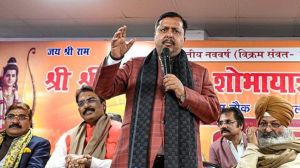Mr. Q
A FEW months after the Jaish-e-Mohammed sponsored attacks on Parliament on December 13, 2001, an angry New Delhi decided it was time to tic...


A FEW months after the Jaish-e-Mohammed sponsored attacks on Parliament on December 13, 2001, an angry New Delhi decided it was time to tick off Pakistan and ordered the expulsion of its high commissioner to India8212; Ashraf Jehangir Qazi.
Qazi must have been perturbed, but he didn8217;t show it. He returned home to Islamabad and prepared to retire gracefully in the shadow of the Margalla hills. Until Musharraf plucked him out and sent him as his envoy to the all-important job in Washington DC.
As the various layers of the Pakistani power structure8212;the Army, the mullahs, the mujahedin, the fractured parliament and the president8212;exercised their varying degrees of clout after 9/11, it was clear that Musharraf needed an utterly suave and sophisticated officer who could speak English to the Americans, argue, debate and gently insult the liberal-minded East coast media and play both realpolitik and footsie with the White House.
Clearly, it8217;s the same qualities that have helped land him the job of the UN Special Representative in Iraq. Of course the demands of realpolitik means that it is Pakistan8212;really, Musharraf8212;that is being thanked for helping pull some of the US chestnuts out of the Iraq fire by possibly sending troops to guard the UN compound. And that Kofi Annan8217;s chef de cabinet, an influential gentleman in his own right, is a Pakistani national called Reza Mohammed who possibly helped tip the balance in Qazi8217;s favour, when the long distance race between India8217;s former Foreign Secretary Salman Haidar, former Thai foreign minister Pitsuwan and Qazi, reached the final lap.
Whatever it may have been, Qazi8217;s own qualities are sure to pull him through. His baptism by fire in New Delhi must have prepared him for it. There was the time when Khushwant Singh lovingly planted an affectionate peck on one of his daughter8217;s cheeks and the Page 3 photo sent the mullahs back home into a tizzy. Then there was the time when Qazi sent home the report about Najam Sethi, editor of the respected Pakistani weekly Friday Times, being critical of the Nawaz Sharif government at an IIC lecture.
Qazi witnessed the ups and downs of the India-Pakistan relationship during his March 1997-May 2002 tenure, first as Nawaz8217;s envoy to India and then as Musharraf8217;s representative. In the middle came the nuclear tests in May 1998, the Lahore bus ride in February 1999, followed by Kargil and the hijacking of IC-814. But he handled them with aplomb.
That aplomb was very much in evidence in Washington, as after 9/11, he fought against the condemnation of Pakistan by the average American as the battleground of religious terrorism.
In a letter to The New York Times which had written an editorial last December called 8216;8216;Musharraf8217;s Mysteries8217; asking what was going on, Qazi replied with some asperity: 8216;8216;What is going on should be plain enough. The country is undergoing a transition from an unstable, corrupt and personality-centred 8216;kleptocracy8217; to a more sustainable, transparent and institutionalised democracy.8217;8217;
With the much more right-wing Washington Times, he was simply scornful. Placing on record Pakistan8217;s contribution in the war against terror, Qazi asked why it was necessary to 8216;8216;obsessively scrape the bottom of the barrel of pessimism8217;8217; when it came to discussing Pakistan.
Qazi now embarks upon what could be the most important job of his career. He has to make both the UN and the US look good in Iraq. If he does, he8217;s bound to reap the benefits of all the perfumes of Arabia. If he doesn8217;t8212;well, there8217;s no real room for failures at the very top.
- 01
- 02
- 03
- 04
- 05































